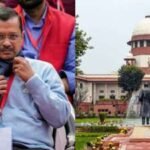Delhi Chief Minister and Aam Aadmi Party leader Arvind Kejriwal’s arrest by the Enforcement Directorate over an alleged liquor policy scam has triggered widespread protests and condemnation from opposition leaders.
 The unprecedented arrest, occurring just before the Lok Sabha election, prompted the AAP to seek recourse from the Supreme Court, with a hearing scheduled for the next day.
The unprecedented arrest, occurring just before the Lok Sabha election, prompted the AAP to seek recourse from the Supreme Court, with a hearing scheduled for the next day.
Despite the arrest, the party has asserted that Kejriwal will continue his official duties even while in jail, potentially sparking a constitutional crisis, as noted by legal experts.
Kejriwal’s arrest followed his failure to comply with multiple summons for questioning by the ED, and a court ruling denying him protection from arrest. The AAP and its allies have criticized the arrest as politically motivated, alleging misuse of government agencies by the BJP to target opposition figures.
The ongoing controversy surrounding the Delhi liquor policy scandal implicates Kejriwal and other AAP leaders, with accusations of corruption and conspiracy.
ED’s Action and Surrounding Events of Arrest
 The enforcement agency, which was probing the money laundering aspect of the case, arrived at Mr. Kejriwal’s residence in the evening. Following a search and questioning session, he was apprehended around 9 pm and transported to the ED office in Delhi two hours later.
The enforcement agency, which was probing the money laundering aspect of the case, arrived at Mr. Kejriwal’s residence in the evening. Following a search and questioning session, he was apprehended around 9 pm and transported to the ED office in Delhi two hours later.
On Thursday, Delhi minister Atishi alleged that Mr. Kejriwal’s arrest is a “conspiracy by the BJP and Prime Minister Narendra Modi.” She emphasized that Kejriwal represents more than just an individual, stating, “Mr. Kejriwal is not just a man, he is an idea. If you think arresting one Kejriwal can finish off the idea, you are wrong.” Atishi reiterated their stance emphasizing that he has not been convicted and no law prevents him from doing so.
During a post-midnight press briefing, AAP announced its decision to organize a nationwide protest against the BJP on Friday. In Delhi, the protest is slated to occur outside the BJP headquarters.
A team from the ED, consisting of 12 officials and led by Additional Director Kapil Raj – the same officer who apprehended former Jharkhand Chief Minister Hemant Soren in January – arrived at Mr. Kejriwal’s residence with a search warrant. During the operation, both Kejriwal and his wife’s phones were confiscated, and data from two tablets and a laptop at their residence was transferred.
While the ED officials conducted their interrogation indoors, the Delhi Police, Rapid Action Force personnel, and CRPF teams were stationed outside. Prohibitory orders were enforced in the vicinity of the residence, leading to the detention of several AAP workers who had gathered to protest Kejriwal’s arrest.
K Kavitha Case Link to Arvind Kejriwal
 The timing of the Delhi CM’s arrest is significant, occurring less than a week after BRS leader K Kavitha was apprehended in the liquor policy case. Following Kavitha’s arrest, Mr. Kejriwal was implicated as a conspirator in the case for the first time. Speculation regarding the possibility of the Delhi CM’s arrest had been rife since the ES issued its first summons in October of the previous year, with Kejriwal being summoned to appear on November 2.
The timing of the Delhi CM’s arrest is significant, occurring less than a week after BRS leader K Kavitha was apprehended in the liquor policy case. Following Kavitha’s arrest, Mr. Kejriwal was implicated as a conspirator in the case for the first time. Speculation regarding the possibility of the Delhi CM’s arrest had been rife since the ES issued its first summons in October of the previous year, with Kejriwal being summoned to appear on November 2.
Former Delhi Deputy CM Manish Sisodia was incarcerated in connection with the same case in February of the previous year, while AAP Rajya Sabha MP Sanjay Singh was detained in October. Kejriwal has consistently denied any wrongdoing in the Delhi liquor policy, alleging that the ED, which he claims is influenced by the BJP, is targeting him for arrest. The AAP and numerous opposition parties have accused the BJP of exploiting central agencies to harass their leaders, particularly in the lead-up to the Lok Sabha elections commencing on April 19.

The AAP’s allies in the INDIA bloc, including the Trinamool Congress and the Congress, have also condemned Kejriwal’s arrest, denouncing it as unconstitutional and politically motivated. Earlier on the same day, the Delhi High Court rejected Kejriwal’s plea for protection from arrest in the liquor policy case but directed the ED to respond to his petition. The matter is scheduled for the next hearing on April 22.
Background and Allegations
In November 2021, the introduction of a liquor policy saw the government stepping back from the retail sale of liquor, allowing private licensees to take charge of stores. However, by July 2022, Delhi Chief Secretary Naresh Kumar raised concerns over significant violations within the policy, citing instances of “undue benefits” granted to liquor licensees. Consequently, the policy was abolished in September of the same year.
Allegations: CBI has asserted that liquor companies played a role in shaping the excise policy, aiming for a 12% profit margin on the wholesale side. It further claimed that a liquor consortium known as the “South Group,” purportedly including Ms. Kavitha, engaged in offering kickbacks, with portions allegedly funneled to public officials. The Enforcement Directorate has accused individuals of laundering these kickbacks.
Political Implications: The BJP has contended that the alleged proceeds from this scandal were utilized by the AAP to finance its campaign for the 2022 Gujarat Assembly elections, during which it secured 12.91% of the votes and cemented its status as a national political entity.











 by
by
Comments 1